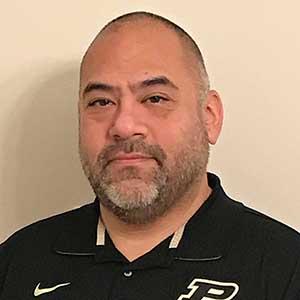Two Purdue summer programs during high school pointed an engineering technology alumnus toward a career path working on a variety of products, from automotive and aircraft parts to medical devices.
“After I took a couple of science programs at Purdue and was introduced to the engineering technology program, I knew it was where I wanted to be,” said Agustin “Tino” Yado (BS ’97, EET). “I had other options, but that experience on campus made the difference.”
Using industry-standard tools provides advantage
Yado credits his Purdue education for enabling him to “hit the ground running” in every new situation he has faced in his career, from his first job after graduation to his current position as senior engineer at Terumo Heart, Inc., in Ann Arbor, Michigan.
“In electrical engineering technology, as in every technology program, you get more than theoretical knowledge,” Yado said. “You get hands-on experience with a lot of equipment used in industry. It provides a significant advantage.”
New graduates should expect to do entry-level tasks, but Yado said having “a low ramp-up time” is key to advancing more quickly into design-level work. “When I started my first job, I was already familiar with many of the devices we used. I got up to speed very fast and was able to excel. That familiarity accelerated my career.”
Creating software for hardware
While majoring in electrical engineering technology, Yado developed an interest in software programming. Much of his career has involved programming software for embedded systems — that is, the software running inside mechanical or electrical systems. Yado worked on software for diagnostic systems for the heavy-duty truck/bus industry, motor controllers for the Airbus A350, generators for small helicopters and hydraulic systems for other aircraft. He also helped design electronics for a blood glucometer and other systems. That experience made him uniquely qualified for Terumo Heart, a company known for developing implantable devices that assist patients suffering severe heart failure by helping their hearts pump blood as they await transplants.
Yado’s job is to lead the software validation efforts of tools used by the company and provide process improvement to the engineering team developing a new generation of products.
“With my experience in embedded systems in the aerospace and medical fields, I serve as a subject matter expert in engineering processes, helping create new procedures when I see something missing or a gap we can fill,” explained Yado. “My background in software lifecycles and validation is helpful as well, especially since working on medical devices is regulated by the Food and Drug Administration.”
Two decades later, Purdue degree still relevant
Even as technology has advanced, Yado still finds his Purdue experiences pertinent to the work he does today, more than 20 years after earning his degree.
“Some of the troubleshooting processes and skills I used in college remain the same,” he said. “I’ve gotten better and faster, but I still go about things the same way. I’ve always been able to take what I’ve done previously and find some aspect of it that is applicable in my next position.”
Humanities essential in technology-based careers
Yado praises Purdue Polytechnic’s focus on integrating humanities and capstone or internship experiences into every major.
“The humanities are necessary,” said Yado. “At a small company and in small teams, you’re not always going to be doing the same thing. You’ll branch out. You’ll need to communicate with people around the world, manage schedules and budgets, and interface with people working on software teams and mechanical teams. Take all the technical classes you want. But if you want to get promoted through the ranks and lead a team, you need the humanities as well. If you have that background, you won’t need to learn it on the fly.”
Real-world experience is also essential, Yado said. “We’re always looking for people with experience. We look for the degree, but we also ask, ‘what else did you do?’ Capstones and internships make you better prepared than someone who only did coursework.”
Yado said his Purdue engineering technology degree gave him more options than he would have had if he had chosen another major.
“I’ve had a lot of success in my career,” said Yado. “I attribute a lot of it to Purdue.”

